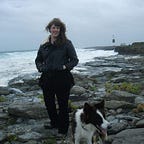René Recommends: “Purple Heather” by Van Morrison
Van Morrison’s “Purple Heather” is a song about idyllic summer-end love, but I feel spring whenever I hear it. Maybe it’s because I associate spring with hope, and hope with love — new or past, fleeting or undying, idyllic or otherwise.
It could also be some quality in Van’s voice, maybe the playful jazziness he brings to the song, a Scottish/Irish folk standard usually recorded under the title “Wild Mountain Thyme” or “Will Ye Go Lassie Go.” Joan Baez, Ed Sheeran, The Corries, Marianne Faithfull, and Rod Stewart are just a few other artists who’ve recorded it. But their versions tend to approach it with melancholic yearning or straight-take sincerity. And most of them stick to the song’s original spring setting (“Oh the summertime is coming” versus Van’s “Well the summertime has gone”).
Typical Van had to go and be contrary. Idiosyncratic. Along with changing up the song’s season, he sings almost every line with a different emotion. This phrase sounds plaintive, the next hesitant, the next direct and strong. And yet as a whole, the song distills the spirit of enchantment, the experience of perfect, first love. That’s the magic of Van Morrison.
I knew the traditional version, “Will Ye Go Lassie Go,” before any other. I grew up in a home where we listened to Irish folk music, to the records and tapes of local bands that played in the Irish pubs around Chicago. One of those bands played at the wedding reception of my middle brother, when I was about 11, and this was where I first heard the song. I thought it was beautiful, but like something trapped in another time — “precious” is how I’d describe it. Not really expressive of a living, breathing, passionate love, despite the lyric’s best efforts.
It would be 30 years before I’d finally hear the version that put it all together.
I was in Ireland in a car being driven by a friend. It was September and night and we were on a dark, narrow, winding road with a mountain on one side and the Atlantic cliffs on the other. My friend was angry about something, but quiet — taking out her feelings through the steering wheel, driving a little too fast for my comfort. I was afraid and amused and annoyed all at the same time. Then Van’s song came on the radio and somehow managed to get through the charge of emotions in the car to my attention. That too is the magic of Van Morrison.
A couple weeks prior, I’d met up with a former sweetheart elsewhere in the country, someone with whom I had an emotional history even more tangled than the energy in the car that night, when my meeting with him was still on my mind. I knew him when I was young, in my early 20s, when everything in life seems so urgent, especially what you’re lacking, especially any love less than idyllic all the time, which of course is most all human love. I think if I’d heard “Purple Heather” back in those days, it would’ve wrecked me — or saved me. The song captures the spirit of perfect love so well, anything that fell short in real life would’ve been too painful to endure. I might have given up the effort to match it earlier on, before the pain of shortcoming did its damage.
But then I would’ve missed out entirely. I would’ve had not even a moment’s memory of idyll to carry with me for years to come — nothing to regret but nothing to savor. Nothing to bring to the emotions and idiosyncrasies of the best love songs, to piece together the mercurial phrasings of one of music’s great troubadours. Van’s song in the car that night would’ve been just distraction, just background music for a reckless drive, instead of testimony for a passionate and reckless youth, for my imperfect swing at perfect love.
